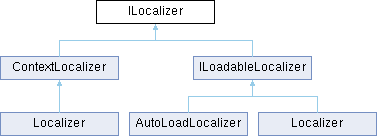Converter of strings from a base-language value to its corresponding language-specific localization. More...

Public Member Functions | |
| string | Localize (PlainString text) |
| Localizes a string. More... | |
| string | Localize (FormattableString frmtText) |
| Localizes an interpolated string. More... | |
| string | LocalizeFormat (string format, params object[] args) |
| Localizes and then formats a string. More... | |
| IEnumerable< string > | Localize (IEnumerable< string > texts) |
| Localizes multiple strings. More... | |
| ILocalizer | Context (string contextId) |
| Gets the localizer for a context in the current localizer. More... | |
| ILocalizer | Context (IEnumerable< string > splitContextIds) |
| Gets the localizer for a context in the current localizer. More... | |
Properties | |
| string | TargetLanguage [get] |
| Target language of the localizer. More... | |
| CultureInfo | TargetCulture [get] |
| Target culture of the localizer. More... | |
Detailed Description
Converter of strings from a base-language value to its corresponding language-specific localization.
Member Function Documentation
◆ Context() [1/2]
| ILocalizer Context | ( | IEnumerable< string > | splitContextIds | ) |
Gets the localizer for a context in the current localizer.
Contexts are used to disambiguate the conversion of the same base-language string to different language-specific strings depending on the context where the conversion is performed.
- Parameters
-
splitContextIds Chain of context identifiers in split form.
- Returns
- Localizer for the given context.
Implemented in AutoLoadLocalizer, and ContextLocalizer.
◆ Context() [2/2]
| ILocalizer Context | ( | string | contextId | ) |
Gets the localizer for a context in the current localizer.
Contexts are used to disambiguate the conversion of the same base-language string to different language-specific strings depending on the context where the conversion is performed.
Contexts can be nested. The context identifier can identify a chain of nested contexts by separating their identifiers with the '.' character (left = outermost / right = innermost).
- Parameters
-
contextId Identifier of the context.
- Returns
- Localizer for the given context.
Implemented in AutoLoadLocalizer, and ContextLocalizer.
◆ Localize() [1/3]
| string Localize | ( | FormattableString | frmtText | ) |
Localizes an interpolated string.
Converts the composite format string of the base-language formattable string frmtText (e.g. an interpolated string) to its corresponding language-specific localized composite format value, and then generates the result by formatting the localized composite format value along with the frmtText arguments by using the formatting conventions of the localizer culture.
- Parameters
-
frmtText Base-language formattable string.
- Returns
- Formatted string generated from the language-specific localized format string if found, or generated from frmtText otherwise.
- Exceptions
-
FormatException Thrown when the localized format value of frmtText is invalid.
Implemented in AutoLoadLocalizer, and ContextLocalizer.
◆ Localize() [2/3]
| IEnumerable< string > Localize | ( | IEnumerable< string > | texts | ) |
Localizes multiple strings.
Converts the base-language strings in texts to their corresponding language-specific localized values.
- Parameters
-
texts Base-language strings.
- Returns
- Language-specific localized strings if found, or the base-language string otherwise.
Implemented in AutoLoadLocalizer, and ContextLocalizer.
◆ Localize() [3/3]
| string Localize | ( | PlainString | text | ) |
Localizes a string.
Converts the base-language string text to its corresponding language-specific localized value.
- Parameters
-
text Base-language string.
- Returns
- Language-specific localized string if found, or text otherwise.
Implemented in AutoLoadLocalizer, and ContextLocalizer.
◆ LocalizeFormat()
| string LocalizeFormat | ( | string | format, |
| params object[] | args | ||
| ) |
Localizes and then formats a string.
Converts the base-language format string format to its corresponding language-specific localized format value, and then generates the result by formatting the localized format value along with the args arguments by using the formatting conventions of the localizer culture.
- Parameters
-
format Base-language format string. args Arguments for the format string.
- Returns
- Formatted string generated from the language-specific localized format string if found, or generated from format otherwise.
- Exceptions
-
FormatException Thrown when format or its localized format value is invalid.
Implemented in AutoLoadLocalizer.
Property Documentation
◆ TargetCulture
|
get |
Target culture of the localizer.
Implemented in AutoLoadLocalizer, and ContextLocalizer.
◆ TargetLanguage
|
get |
Target language of the localizer.
Implemented in AutoLoadLocalizer, and ContextLocalizer.